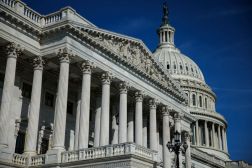Senate legislation would codify Presidential Innovation Fellows

Several senators introduced legislation Wednesday that would codify the Presidential Innovation Fellows program, which embeds private-sector innovators into federal agencies for a yearlong tour.
Sens. Mark Warner, D-Va., James Lankford, R-Okla., and Cory Booker, D-N.J., introduced the bill to codify the program institutionalized under a 2015 executive order by President Obama. The legislation is considered a companion bill, with some technical changes, to the House’s TALENT Act of 2016, which passed in July.
The goal is to set the project in stone in anticipation of a changing administration.
“This bill creates a permanent pipeline for our nation’s best and brightest to innovate inside government agencies, allowing for an injection of private sector expertise without creating bureaucratic bloat or displacing change-makers within government,” Warner said in a statement. “The contributions of the talented participants of the Presidential Innovation Fellows program will help us build a more efficient, accessible, and accountable government for generations to come.”
Lankford called the bill “commonsense legislation,” and Booker said that making the program permanent will make sure government can keep pace with innovation.
“The Presidential Innovation Fellows program has furnished our nation’s boldest engineers and technologists with a unique opportunity to work with government agencies on providing more innovative and engaging services to the public,” Booker said.
Fellows — known as PIFs — have contributed to major federal technology projects such as the launch of Data.gov, the Police Data Initiative, Blue Button and the RFP-EZ platform.
Several fellows this year also worked on a project with the Commerce Department and the White House’s Council on Women and Girls called Hack the Pay Gap, which was designed to “open up troves of census data at the intersection of income and gender” to encourage citizens to build tools to close the gender pay gap, Smita Satiani, deputy director for the Presidential Innovation Fellows program, told FedScoop in July.
[Read more: Citizens use census data to Hack the Pay Gap]
The tools created as a part of the initiative tackled everything from salary negotiation and the cost of goods based on wage inequality to how maternity leave affects the pay disparity.
People shopping online, for example, can use a Google Chrome extension or interactive microsite called Raise Above the Wage to see the cost of an item adjusted for wage inequality.
Through the extension, a user could find that based on median wage, an African-American woman would have to work 42 minutes longer than a white man to afford a $12.50 lunch.
“When you see the quality of the products that were produced I think it really speaks to you know the power of government and citizens collaborating in this way,” said Kyla Fullenwider, a 2016 PIF who worked on the initiative with Satiani.
Many PIFs have stayed on with the federal government after their fellowship ended, taking innovative roles with agencies — many as part of the 18F team at the General Services Administration, which currently houses the Presidential Innovation Fellows program.
The program began accepting applications for its 2017 class last week.






